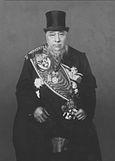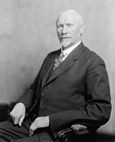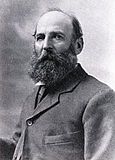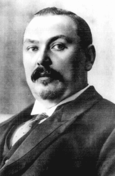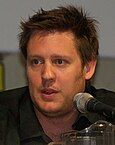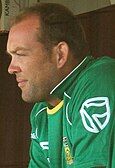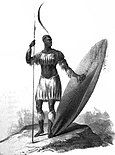Portal:South Africa/Selected biography
Usage
The layout design for these subpages is at Portal:South Africa/Selected biography/Layout.
- Add a new Selected biography to the next available subpage.
- Update "max=" to new total for its {{Random portal component}} on the main page.
Selected biographies list
Selected biography 1
Portal:South Africa/Selected biography/1
Oscar Leonard Carl Pistorius ("Blade Runner") is a South African amputee sprint runner. Pistorius competed in able-bodied and disabled events with the assistance of carbon-fibre prosthetics. On 14 February 2013, Pistorius was charged with the murder of his girlfriend Reeva Steenkamp, who was fatally shot at his home in Pretoria in the early hours of that morning.Selected biography 2
Portal:South Africa/Selected biography/2
Stephanus Johannes Paulus Kruger (10 October 1825 – 14 July 1904), better known as Paul Kruger, and affectionately known as Uncle Paul (Afrikaans: "Oom Paul"), was State President of the South African Republic (Transvaal). He gained international renown as the face of Boer resistance against the British during the South African or Second Boer War (1899–1902).Selected biography 3
Portal:South Africa/Selected biography/3
Nelson Rolihlahla Mandela (Xhosa pronunciation: [xoˈliːɬaɬa manˈdeːla]; born 18 July 1918) is a South African anti-apartheid revolutionary and politician who served as President of South Africa from 1994 to 1999. He was the first black South African to hold the office, and the first elected in a fully representative, multiracial election. His government focused on dismantling the legacy of apartheid through tackling institutionalised racism, poverty and inequality, and fostering racial reconciliation. Politically a democratic socialist, he served as the President of the African National Congress (ANC) from 1991 to 1997. Internationally, Mandela was the Secretary General of the Non-Aligned Movement from 1998 to 1999.Selected biography 4
Portal:South Africa/Selected biography/4
Johan Anthoniszoon "Jan" van Riebeeck (21 April 1619, Culemborg, Gelderland – 18 January 1677) was a Dutch colonial administrator and founder of Cape Town. Van Riebeeck was Commander of the Cape from 1652 to 1662; he was charged with building a fort, with improving the natural anchorage at Table Bay, planting cereals, fruit and vegetables and obtaining livestock from the indigenous Khoi people. In the Kirstenbosch National Botanical Garden in Cape Town there is a Wild Almond hedge still surviving, that was planted on his orders as a protective barrier around the Dutch settlement. The initial fort, named Fort de Goede Hoop ('Fort of Good Hope') was made of mud, clay and timber, and had four corners or bastions. This fort was replaced by the Castle of Good Hope, built between 1666 and 1679 after van Riebeeck had left the Cape.Selected biography 5
Portal:South Africa/Selected biography/5
Jan Christiaan Smuts, OM, CH, ED, KC, FRS, PC (24 May 1870 – 11 September 1950) was a prominent South African and British Commonwealth statesman, military leader and philosopher. In addition to holding various cabinet posts, he served as Prime Minister of the Union of South Africa from 1919 until 1924 and from 1939 until 1948. He served in the First World War and as a British field marshal in the Second World War. He led commandos in the Second Boer War for the Transvaal. During the First World War, he led the armies of South Africa against Germany, capturing German South-West Africa and commanding the British Army in East Africa. From 1917 to 1919, he was also one of five members of the British War Cabinet, helping to create the Royal Air Force. He became a field marshal in the British Army in 1941, and served in the Imperial War Cabinet under Winston Churchill. He was the only person to sign the peace treaties ending both the First and Second World Wars.Selected biography 6
Portal:South Africa/Selected biography/6
General Jacobus Herculaas de la Rey (22 October 1847 – 15 September 1914), known as Koos de la Rey, was a Boer general during the Second Boer War and is widely regarded as being one of the strongest military leaders during that conflict.He is generally regarded as the bravest of the Boer generals during the Second Boer War and as one of the leading figures of Boer independence. As a guerrilla, his tactics proved extremely successful. De la Rey opposed the war until the last, but when he was once accused of cowardice during a Volksraad session by President Paul Kruger, he replied that if the time for war came, he would be fighting long after Paul Kruger had given up and fled for safety. This proved to be the case.
Selected biography 7
Portal:South Africa/Selected biography/7
Louis Botha (27 September 1862 – 27 August 1919) was an Afrikaner and first Prime Minister of the Union of South Africa—the forerunner of the modern South African state. A Boer war hero during the Second Boer War he would eventually fight to have South Africa become a British Dominion.In 1899, Botha fought in the Second Boer War, initially under Lucas Meyer in Northern Natal, and later as a general commanding and fighting with impressive capability at Colenso and Spioen kop. On the death of P. J. Joubert, he was made commander-in-chief of the Transvaal Boers, where he demonstrated his abilities again at Belfast-Dalmanutha. After the battle at the Tugela Botha granted a twenty-four hour armistice to General Buller to enable him to bury his dead.
Selected biography 8
Portal:South Africa/Selected biography/8
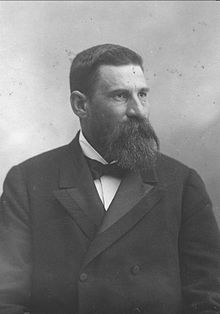
Sir Cornelius Hermanus Wessels (26 April 1851 Rietfontein, Winburg, Orange River Sovereignty – 1 March 1924 Bloemfontein, Orange Free State, Union of South Africa) was a South African statesman.
Wessels stemmed from an important Orange Free State family clan, dedicated to farming and the Boer way of life. Mainly self-educated, he turned to politics in his early thirties. As a member of the Volksraad he developed his skills as a diplomat and mediator, and was involved in many of the important political decisions the Orange Free State had to make in the 1880s and 1890s. In 1897 he was appointed president of the Volksraad. (Full article...)
Selected biography 9
Portal:South Africa/Selected biography/9 Christiaan Neethling Barnard (8 November 1922 – 2 September 2001) was a South African cardiac surgeon who performed the world's first successful human-to-human heart transplant. He performed the world's first human heart transplant operation on 3 December 1967, in an operation assisted by his brother, Marius Barnard; the operation lasted nine hours and used a team of thirty people. The patient, Louis Washkansky, was a 54-year-old grocer, suffering from diabetes and incurable heart disease. Barnard later wrote, "For a dying man it is not a difficult decision because he knows he is at the end. If a lion chases you to the bank of a river filled with crocodiles, you will leap into the water, convinced you have a chance to swim to the other side."
Selected biography 10
Portal:South Africa/Selected biography/10
Elon Musk (born 28 June 1971) is a South African entrepreneur who is based in the United States. He is best known for founding SpaceX and for co-founding Tesla Motors and PayPal (originally X.com). At SpaceX he is the CEO and Chief Designer and at Tesla Motors he is Product Architect. Musk is also Chairman of SolarCity.He holds a bachelor's degree in Economics from the The Wharton School, Musk was born in Pretoria, South Africa to a Canadian mother, Maye (née Haldeman), and a South African father, Errol Musk. His mother's heritage includes Pennsylvania Dutch. His father is of South African Dutch and English descent.
Selected biography 11
Portal:South Africa/Selected biography/11
Mark Richard Shuttleworth (born 18 September 1973) is a South African entrepreneur, and space tourist who became the first South African in space. Shuttleworth founded Canonical Ltd. and provides leadership for the Ubuntu operating system. He currently lives on the Isle of Man and holds dual citizenship of South Africa and the United Kingdom.Selected biography 12
Portal:South Africa/Selected biography/12
Neill Blomkamp (born 17 September 1979 in Johannesburg, South Africa) is a South African-Canadian film and advertisement writer and director. Blomkamp employs a documentary-style, hand-held, cinéma vérité technique, blending naturalistic and photo-realistic computer-generated effects. He is best known as the co-writer and director of critically acclaimed District 9 and the upcoming science fiction film Elysium. He is based out of Vancouver, British Columbia.Time named Blomkamp as one of the 100 Most Influential People of 2009. Forbes magazine named him as the 21st most powerful celebrity from Africa.
Selected biography 13
Portal:South Africa/Selected biography/13
Shaun Morgan Welgemoed (born 21 December 1978) is a South African musician identified as the frontman and main guitarist of the Post Grunge music group Seether.In the May of the year 1999, Welgemoed became the rhythm guitarist and back-up vocalist of a new band, Saron Gas. There were four other members to the band; a female vocalist, a lead guitarist, bassist and drummer. However, when the singer and guitarist did not turn up to the first practice, the band decided to stay as a three-piece, with Welgemoed on lead vocals and guitar. Saron Gas enjoyed moderate success before the bass player decided to quit in January 2000, causing Welgemoed to get in touch with the only other good bass player he knew, Dale Stewart. The band released an album later that year, entitled Fragile.
In January 2002, the band relocated to the United States to sign with Wind-up Records. During this time the band’s original drummer left to return home to South Africa, whilst the two remaining members were left to think of a new band name, at the request of Wind-up. Eventually they settled on Seether, after the Veruca Salt song of the same name. Shaun Morgan and Seether went on to release their debut major-label album, Disclaimer, on 20 August 2002.
Selected biography 14
Portal:South Africa/Selected biography/14
Helen Zille (legal name Otta Helene Maree née Zille; born 9 March 1951) was the Premier of the Western Cape, a member of the Western Cape Provincial Parliament, leader of South Africa's opposition Democratic Alliance political party, and a former Mayor of Cape Town.Zille is a former journalist and anti-apartheid activist, and was one of the journalists who exposed the truth behind the death of Black Consciousness leader Steve Biko while working for the Rand Daily Mail in the late 1970s. She also worked with the Black Sash and other pro-democracy groups during the 1980s. In the political arena, Zille has worked in all three tiers of government – as the Western Cape province's education MEC (1999–2004), as a Member of Parliament (2004–2006), as Mayor of Cape Town (2006–2009), and as Premier of the Western Cape (2009–present).
Zille's work as mayor, and in particular her successes in tackling crime, drug abuse and unemployment in Cape Town, led to her selection as World Mayor of the Year in 2008 - from a field of 820 candidates. She was also chosen as Newsmaker of the year 2006 by the National Press Club in July 2007, and is a former finalist in the South African Woman of the Year Award. Zille speaks English, Afrikaans, and Xhosa as well as German, the language of her parents.
Selected biography 15
Portal:South Africa/Selected biography/15
Jacques Henry Kallis (born 16 October 1975) is a South African cricketer. As a right-handed batsman and right-arm fast-medium swing bowler, Kallis is regarded as one of the greatest all-rounders ever. To date, he is the only cricketer in the history of the game to hold more than 11,000 runs and 250 wickets in both one day and Test match cricket.Kallis has played over 150 Test matches and boasts a batting average of just under 57 runs per innings. From October to December 2007 he produced a streak of five centuries in four Test Matches; with his century in the second innings of the third test against India in January 2011, his 40th in all, he moved past Ricky Ponting to become the second-highest scorer of Test centuries, behind only Sachin Tendulkar, who currently has 51 centuries.
Selected biography 16
Portal:South Africa/Selected biography/16
Robert "Robbie" Hunter (born 22 April 1977) is a South African professional road racing cyclist, who currently rides for UCI ProTeam EF Education–EasyPost. Born in Johannesburg, South Africa, Hunter currently resides in Arth, Switzerland.Hunter became the first South African to compete in the Tour de France, when he did so in 2001. In 2006, Hunter rode for Phonak in the UCI ProTour, but after their disbandment he signed for UCI Continental Circuits side Barloworld for 2007. His achievements include winning stages at the 1999 and 2001 Vuelta a Españas, the 2007 Tour de France, and the overall title at the 2004 Tour of Qatar, as well as the points classification at the 2004 Tour de Suisse.
Selected biography 17
Portal:South Africa/Selected biography/17
Anton van Wouw (20 November 1862, Driebergen - 30 July 1945, Pretoria) was a Dutch-born sculptor regarded as the father of South African sculpture.Van Wouw decided to move to the developing city of Pretoria at the age of 28 and waited for ten years to receive his first commission. This was from financier Sammy Marks to create a monumental statue of Paul Kruger, which stands on Church Square.
During his time spent in the wilderness he developed a great admiration for the Boer nation. This also influenced his artistic development a great deal. He identified with the struggles and hopes of these people and this commitment was reflected in his work.
A great deal of his work, although representational, captures the rugged and emotional essence of his subjects. One of his most notable pieces of work is the figure of a woman used in the Women’s Monument near Bloemfontein. He collaborated on this with the architect Frans Soff. He was also responsible for the less successful figure of a woman incorporated into the Voortrekker Monument near Pretoria, a powerful bust of General Christiaan de Wet and the statue of Louis Botha in Durban.
He also portrayed indigenous peoples and among these smaller sculptures some of his finest work can be found. They are much less formal than his larger work and are appealing in their vivid and lifelike facial expressions.
Selected biography 18
Portal:South Africa/Selected biography/18
Chad Guy Bertrand le Clos, OIS (born 12 April 1992) is a South African swimmer who is an Olympic and Commonwealth Games champion as well as the Commonwealth record holder in the 50 and 100 meter butterfly. He won gold in the 200 meter butterfly and silver in the 100 meter butterfly in the 2012 Olympics in London. He also won five medals at the 2010 Summer Youth Olympics in Singapore.He attended Westville Boys' High School in Durban, South Africa, matriculating in 2010. He has been swimming from a very young age, and when he started competing at the age of 10 he already had a few years of training under his belt.
Le Clos was conferred the silver Order of Ikhamanga on 27 April 2013 in absentia. In a statement by the Chairperson of the National Orders Advisory Council, Dr. Cassius Lubisi, le Clos was conferred the honour "For his excellent achievements on the international swimming stage, especially at the London Olympics in 2012, thus placing South Africa in high standing globally in the field of Aquatic sports."
Selected biography 19
Portal:South Africa/Selected biography/19
Emily Hobhouse (9 April 1860 – 8 June 1926) was a British welfare campaigner, who is primarily remembered for bringing to the attention of the British public, and working to change, the deprived conditions inside the British concentration camps in South Africa built for Boer women and children during the Second Boer War.She became an honorary citizen of South Africa for her humanitarian work there. Her ashes were ensconced in a niche in the National Women's Monument at Bloemfontein, where she was regarded as a heroine; her memorial service was the greatest granted to a non–South African. The southernmost town in Eastern Free State is named Hobhouse, after her, as was a submarine: the SAS Emily Hobhouse, one of the South African Navy's three Daphné class submarines; the submarine was later renamed Umkhonto.
Selected biography 20
Portal:South Africa/Selected biography/20
Shaka kaSenzangakhona (c. 1787 – c. 22 September 1828), also known as Shaka Zulu, was the most influential leader of the Zulu Kingdom. He is widely credited with uniting many of the Northern Nguni people, specifically the Mtetwa Paramountcy and the Ndwandwe into the Zulu Kingdom, the beginnings of a nation that held sway over the portion of southern Africa between the Phongolo and Mzimkhulu Rivers, and his statesmanship and vigour marked him as one of the greatest Zulu kings. Research continues into the character and methods of the Zulu warrior king, whose reign still greatly influences South African culture.Selected biography 21
Portal:South Africa/Selected biography/21
Charlize Theron (born 7 August 1975) is a South African actress and fashion model. She rose to fame in the late 1990s following roles in The Devil's Advocate (1997), Mighty Joe Young (1998), and The Cider House Rules (1999). Theron won the Academy Award for Best Actress, the Golden Globe Award for Best Actress - Motion Picture Drama, the Silver Bear and many other awards for her portrayal of serial killer Aileen Wuornos in Monster (2003), becoming the first South African to win an Academy Award in a major acting category. In recent years she has also moved into the field of producing, both in television and film.She received further Academy Award and Golden Globe nominations for her performance in North Country in 2005, and a Golden Globe nomination for her performance in Young Adult in 2011. In 2012 she appeared in Snow White & the Huntsman and Prometheus. Theron became a US citizen in 2007, while retaining her South African citizenship.
Selected biography 22
Portal:South Africa/Selected biography/22
Wolraad Woltemade (c.1708 – 1 June 1773) was born in Hesse-Schoumberg, part of present-day Germany. He migrated to the Dutch Cape Colony at Cape Town with the Dutch East India Company) as a dairyman. He died while rescuing sailors from the wreck of the ship De Jonge Thomas in Table Bay on 1 June 1773.Selected biography 23
Portal:South Africa/Selected biography/23
Stephen Bantu Biko (18 December 1946 – 12 September 1977) was an anti-apartheid activist in South Africa in the 1960s and 1970s.
A student leader, he later founded the Black Consciousness Movement which would empower and mobilize much of the urban black population. Since his death in police custody, he has been called a martyr of the anti-apartheid movement. While living, his writings and activism attempted to empower black people, and he was famous for his slogan "black is beautiful", which he described as meaning: "man, you are okay as you are, begin to look upon yourself as a human being". Even though Biko was never a member of the African National Congress (ANC), the ANC has included him in the pantheon of struggle heroes, going as far as using his image for campaign posters in South Africa's first non-racial elections in 1994.
Nelson Mandela said of Biko: "They had to kill him to prolong the life of apartheid."
Selected biography 24
Portal:South Africa/Selected biography/24
Frederik Willem de Klerk OMG DMS (/də ˈklɜːrk, də ˈklɛərk/ də-KLURK, də-KLAIRK, Afrikaans: [ˈfriədərək ˈvələm də ˈklɛrk]; 18 March 1936 – 11 November 2021) was a South African politician who served as state president of South Africa from 1989 to 1994 and as deputy president from 1994 to 1996. As South Africa's last head of state from the era of white-minority rule, he and his government dismantled the apartheid system and introduced universal suffrage. Ideologically a social conservative and an economic liberal, he led the National Party (NP) from 1989 to 1997.
Born in Johannesburg to an influential Afrikaner family, de Klerk studied at Potchefstroom University before pursuing a career in law. Joining the NP, to which he had family ties, he was elected to parliament and sat in the white-minority government of P. W. Botha, holding a succession of ministerial posts. As a minister, he supported and enforced apartheid, a system of racial segregation that privileged white South Africans. After Botha resigned in 1989, de Klerk replaced him, first as leader of the NP and then as State President. Although observers expected him to continue Botha's defence of apartheid, de Klerk decided to end the policy. He was aware that growing ethnic animosity and violence was leading South Africa into a racial civil war. Amid this violence, the state security forces committed widespread human rights abuses and encouraged violence between the Xhosa and Zulu people, although de Klerk later denied sanctioning such actions. He permitted anti-apartheid marches to take place, legalised a range of previously banned anti-apartheid political parties, and freed imprisoned anti-apartheid activists such as Nelson Mandela. He also dismantled South Africa's nuclear weapons program. (Full article...)
Selected biography 25
Portal:South Africa/Selected biography/25
Daniël Hartman Craven (11 October 1910 – 4 January 1993) was a South African rugby union player (1931–1938), national coach, national and international rugby administrator, academic, and author. Popularly known as Danie, Doc, or Mr Rugby, Craven's appointment from 1949 to 1956 as coach of the Springboks signalled "one of the most successful spells in South African rugby history" during which the national team won 74% of their matches. While as a player Craven is mostly remembered as one of rugby's greatest dive-passing scrumhalves ever, he had also on occasion been selected to play for the Springboks as a centre, fly-half, No.8, and full-back. As the longest-serving President of the South African Rugby Board (1956–93) and chairman of the International Rugby Board (1962, 1973, 1979), Craven became one of the best-known and most controversial rugby administrators. In 1969, Craven sparked outrage among anti-apartheid activists when he allegedly said, "There will be a black springbok over my dead body". Craven denied saying this and in his later career promoted black and coloured training facilities.
Craven earned doctorates in ethnology (1935), psychology (1973) and physical education (1978). He not only created the physical training division of the South African Defence Force (1941) but became the first professor of physical education at Stellenbosch University (1949). (Full article...)
Selected biography 26
Portal:South Africa/Selected biography/26
Nadine Gordimer (20 November 1923 – 13 July 2014) was a South African writer and political activist. She received the Nobel Prize in Literature in 1991, recognised as a writer "who through her magnificent epic writing has ... been of very great benefit to humanity".
Gordimer was one of the most honored female writers of her generation. She received the Booker Prize for The Conservationist, and the Central News Agency Literary Award for The Conservationist, Burger's Daughter and July's People. (Full article...)
Selected biography 27
Portal:South Africa/Selected biography/27
Ignatius Royston Dunnachie Campbell, better known as Roy Campbell (2 October 1901 – 23 April 1957), was a South African poet, literary critic, literary translator, war poet and satirist. Most of his adult life was spent in Europe.
Born into a white South African family of Scottish descent in Durban, Colony of Natal, Campbell was sent to England to attend Oxford University. Instead, he failed the entrance exam and drifted into London's literary bohemia. Following his marriage to the bohemian Englishwoman Mary Garman, he wrote the well-received poem The Flaming Terrapin which brought the Campbells into the highest circles of British literature. (Full article...)


